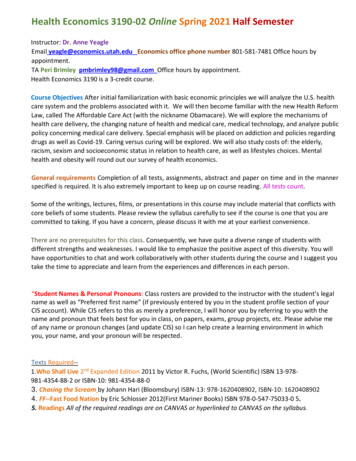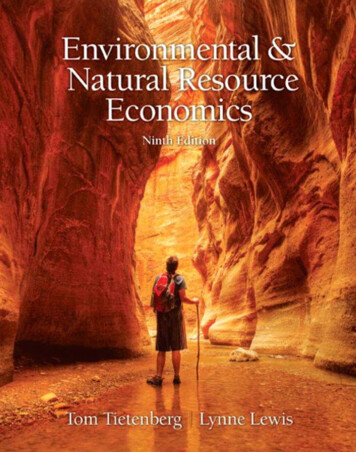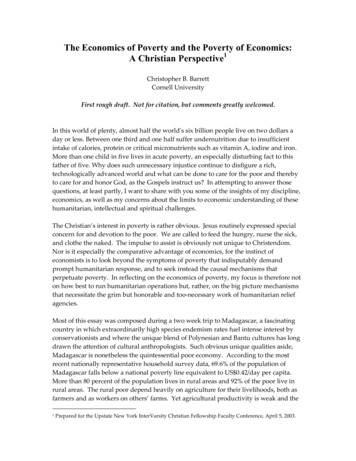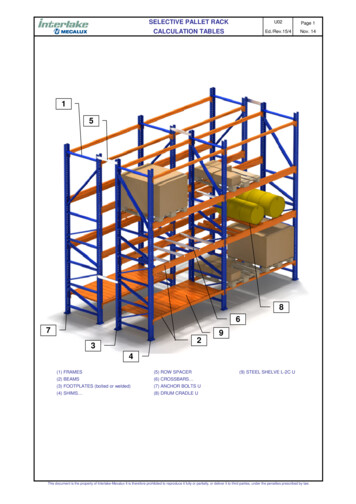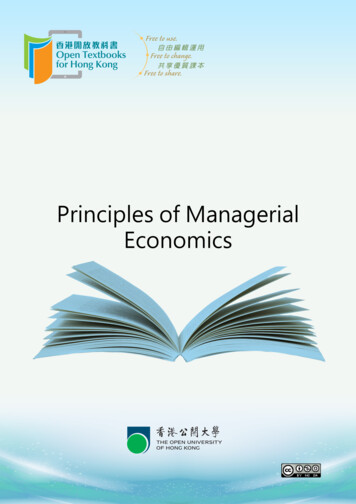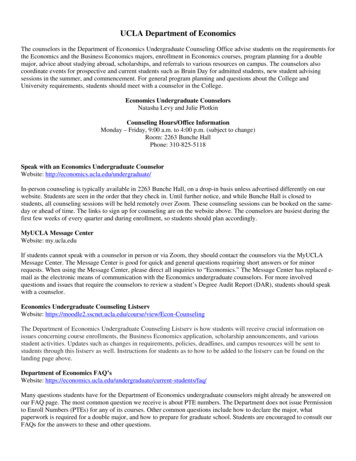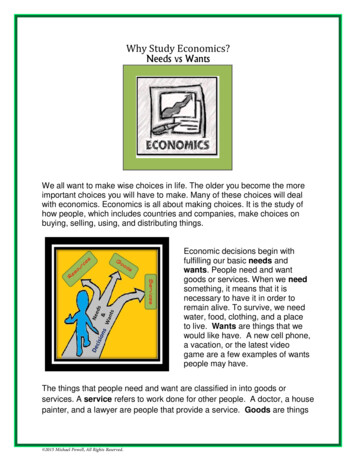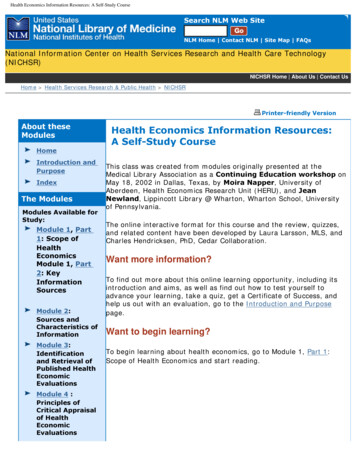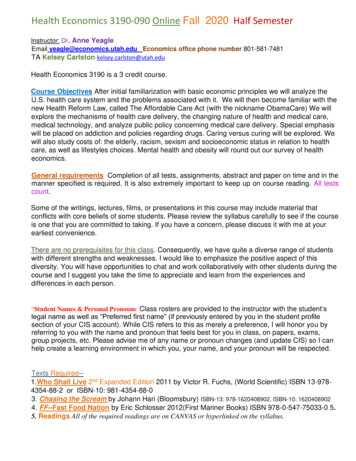
Transcription
Health Economics 3190-090 Online Fall 2020 Half SemesterInstructor: Dr. Anne YeagleEmail yeagle@economics.utah.edu Economics office phone number 801-581-7481TA Kelsey Carlston kelsey.carlston@utah.eduHealth Economics 3190 is a 3 credit course.Course Objectives After initial familiarization with basic economic principles we will analyze theU.S. health care system and the problems associated with it. We will then become familiar with thenew Health Reform Law, called The Affordable Care Act (with the nickname ObamaCare) We willexplore the mechanisms of health care delivery, the changing nature of health and medical care,medical technology, and analyze public policy concerning medical care delivery. Special emphasiswill be placed on addiction and policies regarding drugs. Caring versus curing will be explored. Wewill also study costs of: the elderly, racism, sexism and socioeconomic status in relation to healthcare, as well as lifestyles choices. Mental health and obesity will round out our survey of healtheconomics.General requirements Completion of all tests, assignments, abstract and paper on time and in themanner specified is required. It is also extremely important to keep up on course reading. All testscount.Some of the writings, lectures, films, or presentations in this course may include material thatconflicts with core beliefs of some students. Please review the syllabus carefully to see if the courseis one that you are committed to taking. If you have a concern, please discuss it with me at yourearliest convenience.There are no prerequisites for this class. Consequently, we have quite a diverse range of studentswith different strengths and weaknesses. I would like to emphasize the positive aspect of thisdiversity. You will have opportunities to chat and work collaboratively with other students during thecourse and I suggest you take the time to appreciate and learn from the experiences anddifferences in each person.“Student Names & Personal Pronouns: Class rosters are provided to the instructor with the student’slegal name as well as “Preferred first name” (if previously entered by you in the student profilesection of your CIS account). While CIS refers to this as merely a preference, I will honor you byreferring to you with the name and pronoun that feels best for you in class, on papers, exams,group projects, etc. Please advise me of any name or pronoun changes (and update CIS) so I canhelp create a learning environment in which you, your name, and your pronoun will be respected.Texts Required-1.Who Shall Live 2nd Expanded Edition 2011 by Victor R. Fuchs, (World Scientific) ISBN 13-9784354-88-2 or ISBN-10: 981-4354-88-03. Chasing the Scream by Johann Hari (Bloomsbury) ISBN-13: 978-1620408902, ISBN-10: 16204089024. FF--Fast Food Nation by Eric Schlosser 2012(First Mariner Books) ISBN 978-0-547-75033-0 5.5. Readings All of the required readings are on CANVAS or hyperlinked on the syllabus.
About the books: You can of course purchase the books, or you can utilize the new University system,“inclusive access program”.Here are the links basic access instructions for:Who Shall ail.action?docID 5227114Chasing the etail.action?docID 5236177Fast Food etail.action?docID 3302519Basic access instructions are as follows (#2 is important):1.2.3.4.5.6.7.8.Go to the library http://lib.utah.eduIf off-campus, connect remotely here https://lib.utah.edu/help/off-campus.phpIn the big search box, search for bookClick on the title to see detailsSelect Online AccessFollow the link to ProQuest eBook CentralRead online in your browserFor “Who Shall Live” and “Chasing the Scream,” a limited 7-day download is available via Adobe Digital EditionsThe reading platform has handy features that allow you to link to subsections if you’re wanting to point directly toreadings from your syllabus or course schedule. You can also download chapters as pdfs (amount limits get listed oneach title) as an additional way to provide offline access for your students.If you have issues accessing the books please contact Allyson Mower at"Allyson Mower" allyson.mower@utah.edu
Grading1. Tests-- 3approximately2. Country Presentations3. Review of Country Presentations4. Documentaries,assignments,TED talks and worksheets5. Abstract and virtual meeting for Research Paper6. Research Paper7. Research Presentation and Power Point Posted8. Review of Presentations9. Evaluation of you by your group10. Various points for syllabus, contributing to discussions, etc35-63 points each,5 points possible3 points for each set5- 10 points each possible5 points possible each student20 points possible each student10 points possible each student3 points each Presentation5 points possible1-3 points each1. Tests will be taken online and will be open book with a time limit. Tests will vary in thenumber of points possible due to difficulty and length.2.Country Presentations Each person will pick a country of their choice to report on. See CanvasModule1 for the Country Sign Up and Instructions.3.Review of Country Presentations Fill out the Country Review sheet for the Module. Since wehave a large class, you will be reviewing half of the submissions. You will get an assignmentnotification if you are scheduled to review countries for a Module.4.Documentaries,assignments,TED talks and worksheets We will be watching severaldocumentaries and TED talks as well as having discussion assignments.5, 6 and 7. For the Abstract, Virtual Meeting, Research Paper and Research Presentation andPower Point Posted, please look at those guidelines below. The abstract and virtual meeting isworth 5 points and is due 1 week before your presentation is scheduled. Your paper is due the dayof your presentation being uploaded to CANVAS. The paper is worth 20 points for each student.The presentation is worth 10 points for each student.7. Review of Presentations On the days that the Research presentations are due, you arerequired to watch the video presentation that the group posts on CANVAS and fill out thereview/discussion on Canvas.This is worth 3 points for each of the 20 presentations.8. After your group has turned in your paper and presentation, fill out the group evaluation form onCanvas.Grading There is no curve.A 100%-93A-92-90B 89-87B 86-83B- 82-80C 79-77C 76-73C- 72-70D 69-67D 66-63D- 62-60F 59 -
Class structure1. First of all, I will be offering a mindfulness exercise for each class. This is optional as I wantto offer these exercises in this online course just as I do in my face-to-face classes. Manystudents find that by practicing these mindfulness exercises that they increase their capacityto concentrate and gain better control over their thoughts. (I have also posted some music—just for fun -- that I feel goes along with the topics that we are studying in the Module. Ifyou have any suggestions, I would love to hear from you!)2. I suggest that you view this class as a Monday/Tuesday/Wednesday/Thursday class. I haveset up the dates in the syllabus as such. There are some strict due dates, but many of them,such as reading due dates, are simply suggestions to keep us moving along. I think if youfollow the suggested due dates it will help you keep on track, take things one step at time,and enjoy the process of learning.3. Contacting me. Email is best at yeagle@economics.utah.edu You can also email throughCANVAS but it usually takes about 1 day for me to get the notification.4. I have created many study guides for the books, readings and documentaries. If you fill outthese study guides as you are reading the material then you are all set to go for reviewbefore a test. Occasionally, I may ask you to turn these worksheets in for credit.5. We will be starting and ending the class with two great movies that I know you will love,Escape Fire and Fed Up. The free link to Escape Fire is: (comes with Ads) onTubi: https://tubitv.com/movies/300834/escape fire the fight to rescue american healthcare?utm source google-feed&tracking google-feedThe free watch link for Fed Up is: edu/utahdatabase/play/00FFD908E3022CAE6. For each “Module” on Canvas I also have an outline in the syllabus. In Canvas “Modules” youhave reading assignments and activities to complete.7. There are several activities to facilitate getting everyone involved and meeting a fewnew people in the course.a. The first is a discussion introduction that is divided into small groups so you can meet afew people in the class.b. Another is an I Expect exercise that I have asked you to fill out that I will shareanonymously with the class.c. Next is a 3 minute audio/visual presentation on the Health Status of a Country that youwill pick.d. Another is a group research project (4 people per group) with a paper and anotheraudio/visual presentation.e. I would also like everyone to post a picture of themselves.f. We will also be having some discussion boards where we can all interact8. There are a variety of ways to earn points in the course that range from 3 tests,documentaries, presentations, paper and reviews of others work online.9. There are three online tests as shown above.10. I will be meeting online via Zoom with each group of 4 people about 1 week prior to theirpresentation. The abstract will be due at this time and we can meet and get questionsanswered.
11. It is really important that you check announcements regularly for an online class. You wantto keep up on those since we on online only.12. You will notice that this course requires a lot of reading. Some of you may not read muchand many teachers have moved away from assigning readings. However, much importantresearch has been done on how we learn and reading is one of the most important ways tolearn.Reading is one of the best ways that our brain grows and changes because it has to work.Work is the way we transform anything: construct a building, write a book, make dinner, getourselves dressed, build muscles, get smarter, start and maintain relationships, and basicallyengage in the world.13. We do have a TA for this course, and we will be sharing the reading of your assignments andgrading. Do your own work or you are cheating yourself out of an opportunity to enhanceyour life.14. Keep reminding yourself that you are doing double time with this half semester class! It is alot of work to complete a whole semester class in half the time. If you remind yourself thateach week is in actuality completing two weeks of course work it may help with yourperception of the work load.15. Lastly, with the Covid-19 pandemic looming and affecting all of our lives you may want tokeep on current events in regard to developments. A source that I subscribe to, free, is StatNews. https://www.statnews.com/signup/Academic Honesty: Please note the definitions of cheating, misrepresenting one’s work,inappropriately collaborating, plagiarism, and fabrication or falsification of information from theUniversity Utah Student Handbook, available here: ’Plagiarism’ means the intentional unacknowledged use or incorporation of any other person’s workin, or as a basis for, one’s own work offered for academic consideration or credit or for publicpresentation. Plagiarism includes, but is not limited to, representing as one’s own, withoutattribution, any other individual’s words, phrasing, ideas, sequence of ideas, information or anyother mode or content of expression.”There are many types of plagiarism, all are serious offenses and will be treated according to theUniversity of Utah rules and procedures for student academic conduct outlined in Student Code Policy 6-400: Code of Student Rights and Responsibilities.Any incidents of cheating, misrepresentation, or plagiarism will result in a grade of zero for theassignment. All essays and assignments must be written in your own words with proper citations.Absence on test days: If you miss the timeframe for a test you will need to contact me and if I allowyou an extension, I will need to extend the test time for you.Extra Credit No extra credit will be granted.
See Something, Say Something: Report unsafe or hazardous conditions oncampus. If you see a life threatening or emergency situation, please call 911!Safety Escorts: For students who are on campus at night or past businesshours and would like an escort to your car, please call 801-585-2677. Youcan call 24/7 and a security officer will be sent to walk with you or give youa ride to your desired on-campus location.You will receive important emergency alerts and safety messages regarding campus safety via textmessage. For more information regarding safety and to view available training resources,including helpful videos, visit safeu.utah.edu.1. The Americans with Disabilities Act. The University of Utah seeks to provide equal access to itsprograms, services, and activities for people with disabilities. If you will need accommodations in thisclass, reasonable prior notice needs to be given to the Center for Disability Services, 162 Olpin UnionBuilding, (801) 581-5020. CDS will work with you and the instructor to make arrangements foraccommodations. All written information in this course can be made available in an alternative formatwith prior notification to the Center for Disability Services.2. University Safety Statement. The University of Utah values the safety of all campus communitymembers. To report suspicious activity or to request a courtesy escort, call campus police at 801585COPS (801-585-2677). You will receive important emergency alerts and safety messages regardingcampus safety via text message. For more information regarding safety and to view available trainingresources, including helpful videos, visit safeu.utah.edu.3. Addressing Sexual Misconduct. Title IX makes it clear that violence and harassment based on sex andgender (which Includes sexual orientation and gender identity/expression) is a civil rights offensesubject to the same kinds of accountability and the same kinds of support applied to offenses againstother protected categories such as race, national origin, color, religion, age, status as a person with adisability, veteran’s status or genetic information. If you or someone you know has been harassed orassaulted, you are encouraged to report it to the Title IX Coordinator in the Office of EqualOpportunity and Affirmative Action, 135 Park Building, 801-581-8365, or the Office of the Dean ofStudents, 270 Union Building, 801-581-7066. For support and confidential consultation, contact theCenter for Student Wellness, 426 SSB, 801-581-7776. To report to the police, contact the Departmentof Public Safety, 801-585-2677(COPS).
Research Paper--- Abstract GuidelinesThe Abstract of your group’s Paper/ Presentation is due one week before your paperis due. You are welcome to complete your abstract earlier than one week prior toyour paper due date if you wish to have more time.****When you have your abstract completed, the group leader will set up a Zoommeeting with me that all of the group participants can attend. We will discuss theabstract and your presentation at this virtual meeting.Abstract should be under 300 words and fit on one page.Abstract should include:TitleAuthorsAnd most, if not all of the following:Learning objectivesBackground/ HistoryState the Objective/ The problemConclusion/ Policy Recommendation ReferencesIf I recommend that you need to revise your abstract, points will be given after therevised abstract is complete.The abstract and virtual meeting is worth 5 points for each student.
Research Paper GuidelinesThere will be 20-21 groups with approximately 4 people in each group.Each group of students is required to write a 5 page paper (12 pt Times New Roman font, Doublespacing,1-inch margins) on the subject your group is presenting to the class. Please utilize APA style. The following link may be helpful https://www.scribbr.com/citing-sources/apavsmla/#: :text 0the%20text.&text age%20number.The paper should use at least 5 different reputable sources with proper APA referencing style.These references can include peer reviewed journals, text books, government institutions and nonprofit agencies. Be careful on internet sites that may have a strong bias—check original sourcesused by these sites.The paper is worth 10 points for each student.There will be one paper turned in for each group.Papers are due the day that your group presentation is scheduled to be posted on Canvas.Late papers may incur point penalties.Since there are 4 people in each group, the group should decide as to how to divide the topicinto research/work components. These components should form a coherent whole. Thiscoherent whole should be reflected in your paper as well as your class presentation. Youranalysis should be economic in nature which includes statistics as well as behavioral aspects ofthe topic.The following is a list of the research topics that will be presented during the semester. You willhave the opportunity to sign up for a topic online. You may not get your first choice. My wish isthat the topic is something that interests you; that you would like to learn more about it andshare that information with the rest of the class. Also, it will give you the opportunity to meetsome new people and experience working in a group—which is like many jobs that you will havein the future. If your group has additional ideas pertaining to your assigned subject, please bringthem forward!Medicaid ExpansionEbola, Zika, and CMV VirusesCoronavirus Covid-19AIDS and Sexually Transmitted Diseases in Utah, U.S. and WorldwideCosts of Smoking Tobacco in Utah, U.S and WorldwideDrug Use—Methamphetamine, Pain Killers, Heroin, Alcohol and Marijuana Use in Utah
Screen Addiction—Phone, Social Platforms, Gaming, InternetCosts of Accidents—Auto, Motorcycle, Sports in Utah, U.S. and WorldwideCosts of Eyesight and Hearing Loss in Utah and the U.SCosts of Air and Light PollutionMercury Poisoning in Utah and the Western StatesClimate Change and Health Consequences in Utah, U.S and WorldwideThe Relationship Between Racism, Sexism, Classism and Health in Utah, U.S andWorldwideAffluenza and Hedonic ResetLoneliness, Social Isolation and Health in Utah, U.S. and WorldwideSuicide in Utah, U.S. and WorldwideDepression, Antidepressants and the Pharmaceutical Industry in Utah, U.S. andWorldwideEnd of Life IssuesFast Food Proximity and Food Deserts in Utah, U.S. and WorldwideDiabetes in Utah, U.S. and WorldwideObesity in Utah, U.S. and Worldwide
Presentation GuidelinesEach group of students will be assigned to construct a presentation on the assigned topic that will be givento the class as scheduled on the syllabus.You are required to prepare a Power Point or Prezi presentation.(Your presentation will be judged on content, organization, and clarity.)Use Kaltura Capture on Canvas or create a Youtube that you upload.On Canvas I have instructions on how to create a video using Kaltura Capture in Module 2 and iles?preview 103785962Youtube--Students have access a university GCloud account – this will give them a Google login that they can use toaccess Youtube and that is separate from their personal accounts. To access it, navigateto https://gcloud.utah.edu/ and log in using their CIS ID/password. You can then access Youtube via this account andkeep your schoolwork separate from whatever personal Youtubing you may be doing.The total Presentation should be about 20 minutes. This gives approximately 4 minutes per person tospeak and then 4 minutes to conduct your student audience assignment or quiz. You will lose points if you goover your speaking time of 4 minutes per person. Part of the assignment is to stay within your time limit.No more than 1 minute of video footage is to be used in your complete presentation.You will be posting your presentation to the class on Canvas on the day scheduled along with turningin your paper to me.I suggest that you have different sectors including (the appropriateness will vary will the topic) Background/HistoryObjective/ The problemDataConclusion/ Policy RecommendationReferencesDress up for your Presentation! It will make you feel confident! (And it is part of your evaluation) Classmate engagement exerciseEither during or after your presentation, please prepare a participation exercise for your audience. This maymean asking them questions to consider or writing something down in the early part of your presentation andthen comparing how they think or feel after the presentation. It is up to the discretion of the presenters as towhat this requirement entails. I encourage creativity here . It is also worth 2 points for you so please putsome effort into engaging your audience.Engaging your audience is the most important part of public speaking.GradingDuring the presentation, I will grade each student based on the evaluation guidelines listed below. Thepresentation grade is worth 10 points for each individual student.Evaluation Guidelines for Presentations1. Topic/ Problem stated clearly.012. Quality of information/data013. Policy or learning objective clearly stated.014. Visual presentation of information/ neatness/ effectiveness015. Your individual participation. Professional appearance.012 36. Keeping within the time limit and starting on time017. Preparing/conducting Student audience engagement012Total (10 possible)
Health Economics Syllabus/ Schedule of EventsStudents are responsible to keep updated if this schedule changes. You need to check announcementsregularly!I have designed the course to be treated like a Monday, Tuesday, Wednesday, Thursday class togive some structure and boundaries but due dates are not always on MTWH.Module 1August 24,-25 MT Introduction, Pedagogy, and What is Health Economics?Mindfulness Meditation for the Module found in Lectures on Module 1 in Canvas.1.2.3.4.Monday’s To Do List:Read over the syllabus and check off in Canvas that you did indeed read it.Pick a Country.Fill out Questionnaire on Expectations and turn in.Create a free Zoom account by going to ion-instructions.phpTuesday’s To Do List:1. Please read the following articles:Stressed Out? Try Being Less Competitive,Why We Can’t Look Away From Our Screens,Professors Who See No Evil2. Join the Discussion about Professors Who See No Evil3. Meet some of your peers with the Icebreaker Discussion Post—Due Aug 30You could start watching the documentary Escape Fire (100 min total) (study guide inCanvas (due August 31) Hint! You may want to watch the documentary with the person youwill interview in next week. You can watch the documentary Escape Fire: The Fight to RescueAmerican Healthcare for free (comes with Ads )onTubi: https://tubitv.com/movies/300834/escape fire the fight to rescue american healthcare?utm source google-feed&tracking google-feed Or else I know it is on Amazon andseveral other places for about 4.
Module 2August 26-27 WH Problems with the Health Care System and the OpioidEpidemicMindfulness Meditation for this Module on CanvasWednesday’s To Do List:1. Sign up for a research/presentation topic on CANVAS2. Contact your group and make a plan!3. Please read the following articles:Costs Can Go Up Fast When ER is in Network But the Doctors Are Not(no study guide) Addressing Addiction in the USA (no study guide.)Thursday’s To Do List:1. 10 countries due Today. (you have been assigned a date in advance)2. Check out the My Media instructions for creating and posting /files?preview 1037859623.4.5So that means half the class has 10 countries to review and fill out theCANVAS form on them.Please read the following:o Mirror Mirror 2017 Study guide in Canvas.o Chasing the Scream book Introduction and Chapter 1--study guidein Canvas.Finish Escape Fire (study guide in Canvas) Keep the worksheets to reviewfor the test.
Module 3August 31- Sept 1 MT Interview/Reflections, Johann Hari, and EconomicTerminologyMindfulness Meditation for this Module—on Canvas1.2.3.4.Monday’s To Do List:10 countries due Monday--- so that means you may have 10 countries toreview and fill out the CANVAS form onEscape Fire completed and worksheets filled out by today.Please read Chasing the Scream Chapters 2-4Watch:https://www.ted.com/talks/johann hari everything you think you know about addictio n is wrongTuesday’s To Do List:1.Read and take a look at the following information on Covid-19 before youconduct your interview: Disparities in Coronavirus 2019 Reported Incidence, Knowledge, andBehavior Among US AdultsJAMA June 18, 2020—study guide on Canvas Public Attitudes, Behaviors, and Beliefs Related to COVID-19, Stay-atHome Orders, Nonessential Business Closures, and Public HealthGuidance — United States, New York City, and Los Angeles, May 5–12,2020 MMWR June, 2020 Morbidity and Mortality Weekly Report EarlyRelease / Vol. 69 June 12, 2020—no study guide. https://coronavirus.utah.gov/case-counts/ In the interview and reflectionassignment there is a question about the stats and chart. Click onDemographics in the blue bar. Then scroll down toCases, Hospitalizations, Deaths, and Testing by Race/EthnicityLook at Case Rate/per 100,000, Hospitalization Rate per 1,000 and MortalityRates per 100,000Also look at Comorbidities by Race/Ethnicity5.6.Complete Interview/Reflection Assignment and turn in (Sept 1)Read over Lecture notes called Economic Terms, Elasticities, UniversalCoverage vs Access
Module 4Sept 2 WH The Affordable Care Act, IT, Impacts of Costs, and MichaelFriedrichs Epidemiologist Utah Dept of HealthMindfulness Meditation for this Module—on CanvasWednesday’s To Do List:1. 10 Countries due Wednesday--- so that means you may have 10 countriesto review and fill out the CANVAS form on2. Take the Quiz on Group Presentation Guidelines3.Read (study guides for the following are in packet)Health Care Spending and the Use of IT in OECD Countries study guideWho Really Pays for Health Care? Study guideRising Health Costs and Economic Inequality may threaten yourretirement study guideThursday’s To Do List:1.To check out the latest on Health Care in the US, including Covid-19 take alook at http://www.kff.org/health-reform/2.Read articles Summary of the Affordable Care Act and Health ReformImplementation Timelines.3.Watch Video of IBIS Guest Speaker Michael Friedrichs Utah Departmentof Health Epidemiologist (there will be questions from his presentation on thenext test so fill out the study guide as you watch the presentation. Virtual Meeting with Dr Yeagle on Zoom with Medicaid Expansion GroupDue Wednesday or Thursday depending on scheduling. Virtual Meeting with Dr Yeagle on Zoom with Ebola, Zika and CMVViruses Group Due Wednesday or Thursday depending on scheduling.(Labor Day is next Monday Sept 7)
Module 5September 8-10 TWH Test and Who Shall LiveMindfulness Meditation for the dayTuesday’s To Do List:1. Assignment Due -- Assignment on Summary of the Affordable Care Act andHealth Reform Implementation Timelines articles2. Virtual Meeting with Dr Yeagle on Zoom with Aids and STD Groupscheduled for this week.3. Virtual Meeting with Dr Yeagle on Zoom with Covid-19 Groupscheduled for this week.Wednesday’s (or the Weekend if you prefer to focus on Test 1)To Do List:Read: Fuchs Who Shall Live? Introductions, Preface-Ch 2 pages ix- 55 –fill out study guide. This reading will not be on Test 1. It will be evaluated onTest 2.Thursday’s To Do List:Test 1 Available from Sept 10 at 8:00 am until Sept 12 at 10:00 pm onProfessors Who See No Evil, Escape Fire, Mirror Mirror, Chasing the ScreamIntro-Ch4, Costs Go Up Fast , Mike Friedrichs’ talk, Health CareSpending., Who Really Pays for Health Care Rising Health Costs andEconomic Inequality, Covid Articles, and Economic Terms, Elasticities,Universal Coverage.
Module 6September 14-15 MT Medicaid Expansion and Ebola, Zika and CMV VirusesPresentations, Who Shall Live, Chasing the Scream and AIDS DocumentaryMindfulness Meditation for the dayMonday’s To Do List:1.2.3.4.6.7.8.Presentation and Paper due Medicaid ExpansionPresentation and Paper due Ebola, Zika and CMV VirusesGroup Evaluation Sheet- If you presented your research today please completethe form.Read:Who Shall Live. Fuchs Chapter 5 Study guide in packetChasing the Scream Chapters 5-7. Study guide in packetTuesday’s To Do List:Reviews on Presentations DueStart AIDs doc (questions are in s/10 countries due today--- so that means you have 10 countries to reviewand fill out the CANVAS form on.Virtual Meetings with Dr. Yeagle on Zoom with:Costs of Smoking Tobacco in Utah, U.S and WorldwideDrug Use—Methamphetamine, Pain Killers, Heroin, Alcohol and MarijuanaUse in UtahScreen Addiction—Phone, Social Platforms, Gaming, InternetCosts of Accidents—Auto, Motorcycle, Sports in Utah, U.S. and WorldwideCosts of Eyesight and Hearing Loss in Utah and the U.S
Module 7September 16-17 WH AIDS, STDs, Covid-19, Analyzing Medical Markets, Doctors,Profits, More Chasing the Scream, More Countries and The Global Syndemic1. Mindfulness Meditation for the ModuleWednesday’s To Do List:2. Look over Lecture Notes on Analyzing Medical Markets3. Presentation and Paper due Covid-194. Presentation and Paper due AIDS and Sexually Transmitted Diseases in Utah5. Group Evaluation Sheet- Turn in after your presentation6. Read: (study guides on Canvas)o Dollars for Doctorso Unpacking the Executive Order on Health Care Price Transparency and Quality8. Watch https://www.ted.com/talks/leana wen what your doctor won t disclose 16min9. C
Health Economics 3190-090 Online Fall 2020 Half Semester Instructor: Dr.Anne Yeagle Email yeagle@economics.utah.edu Economics office phone number 801-581-7481 TA Kelsey Carlston kelsey.carlston@utah.edu Health Economics 3190 is a 3 credit course. Course Objectives After initial familiarization with basic economic
